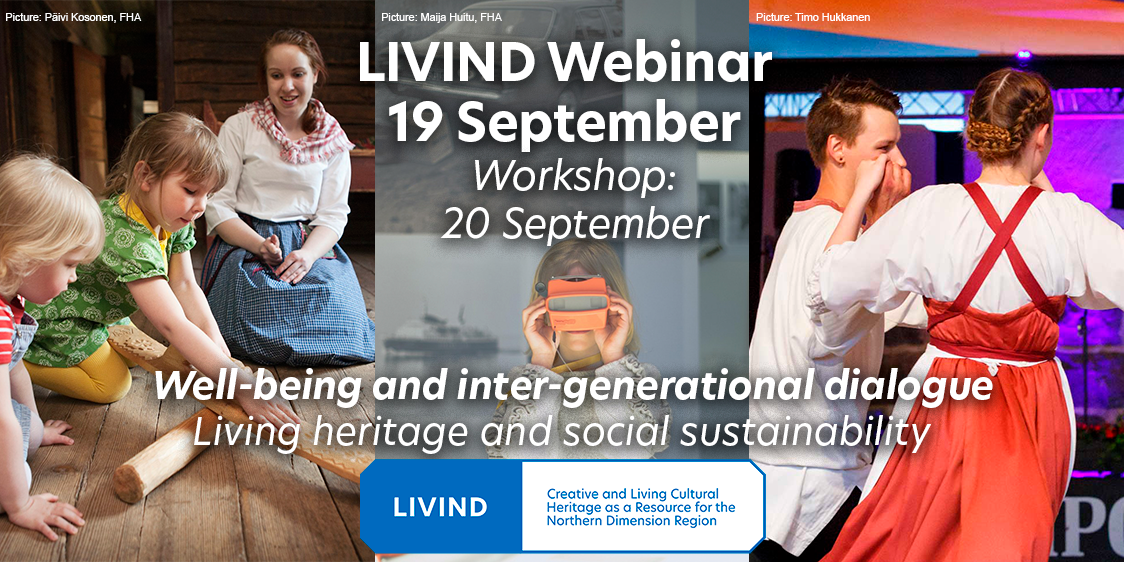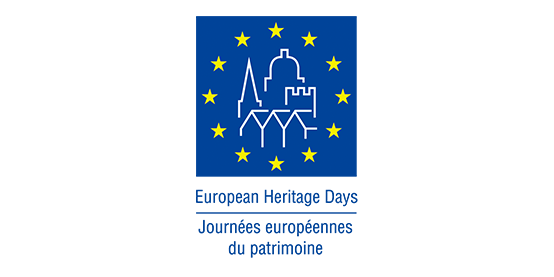
LIVIND Webinar on Living heritage and social sustainability: well-being and inter-generational dialogue
Participation in living heritage practice can add to well-being and strengthen social cohesion that support the socially sustainable development in local communities. Join our next thematic webinar on 19 September to learn more and share your vision and experience!
Webinar
For intangible cultural heritage to flourish and live on over generations, it is vital that different people can experience and participate in living heritage practice. This in turn helps to strengthen inter-generational bonds and social cohesion. Positive encounters and social interaction through traditional dances or storytelling can enhance well-being, promoting both physical and mental health. How can we raise awareness about the positive social and health impacts that living heritage can have? How can living heritage practices be more inclusive? How can they support dialogue and peace-building? Which opportunities does digitization offer both for living heritage safeguarding and building stronger social bonds within and across communities?
Join our webinar Living heritage and social sustainability – well-being and inter-generational dialogue, on 19th September 2022 at 13:30–16:00 EET (12:30–15:00 CET) to hear more and share your vision and experience! The event brings together researcher viewpoints and practical field experience from different LIVIND partner countries.
Programme
(Note: all times in EET)
13:30 Opening & welcome – Leena Marsio and Elisa Kraatari, Finnish Heritage Agency
13:40 A sustainable future – Agency, co-creation and well-being, Pauliina Latvala-Harvilahti, University of Eastern Finland, University of Turku (FI)
14:00 Comment, Elisa Kraatari
14:10 Case examples of ICH and social sustainability
- Higher education on heritage crafts and its contribution to craft communities in Estonia, Ave Matsin, University of Tartu, Department of Estonian Native Crafts (EE)
- Living heritage of dance and wellbeing, Tone Erlien Myrvold, Norwegian Centre for Traditional Music and Dance (NO)
- Safeguarding oral practices and advantages of digitization in 'meänkieli' language community, Constanze Ackermann-Boström, Umeå University (SE)
14:55 Questions and comments
15:00 Coffee break
15:10 Discussions in small groups: social sustainability and ICH – possibilities and challenges.
15:45 Summary of discussions
16:00 Closure
You are also welcome to sign up to the follow-up workshop on Tuesday 20th September (at 14:00-16:00 EET) for further discussion on these issues. We can take up to thirty participants to our online co-working platform.
The webinar is free and open to everyone, whether you are a heritage practitioner, an NGO worker, a museum professional, an entrepreneur, an educator, an artist, an activist, or a researcher. We will bring together an exciting group of people working with different domains of living heritage including crafts, performing arts, environmental know-how, oral heritage, festivities, and food.
Please sign up here by 15th September. We will send a joining link to registered participants.
The webinar is part of the project LIVIND – Creative and living cultural heritage as a resource for the Northern Dimension region, coordinated by the Finnish Heritage Agency and covering nine countries from Northern Europe. The webinar and the workshop are organised by the Finnish Heritage Agency in cooperation with the LIVIND project partners. The language of the event is English.
The event is part of the European Heritage Days whose theme in 2022 is Sustainable Heritage.
ABOUT THE LIVIND PROJECT
LIVIND – Creative and living cultural heritage as a resource for the Northern Dimension region started in September 2021. The project is coordinated by the Finnish Heritage Agency and it brings together partners from nine Northern European countries, as well as the Nordic autonomous regions and the Sápmi area.
LIVIND Opening Webinar was organised in November 2021 with participants from 15 countries. This has been followed by more webinars on living heritage and socially sustainable development focusing on the different aspects of sustainability: ecological, social, and cultural sustainability, see webinar programmes here.
The LIVIND project builds on the intangible cultural heritage safeguarding work, but it is closely linked to the UN Agenda 2030 for Sustainable Development. The project makes use of diverse web-based tools that support fluent exchange and increased co-development work between the diverse actors including public bodies and NGOs from the different countries and areas. The project also involves research activities resulting as analyses and policy briefs that support the further development on living heritage. These materials, along with the good practices and experiences from the pilots implemented during the project will be later available on an online platform.
More information
Please, see the LIVIND webpage.
Elisa Kraatari, Project Coordinator, elisa.kraatari(a)museovirasto.fi
Leena Marsio, Senior Advisor, leena.marsio(a)museovirasto.fi
